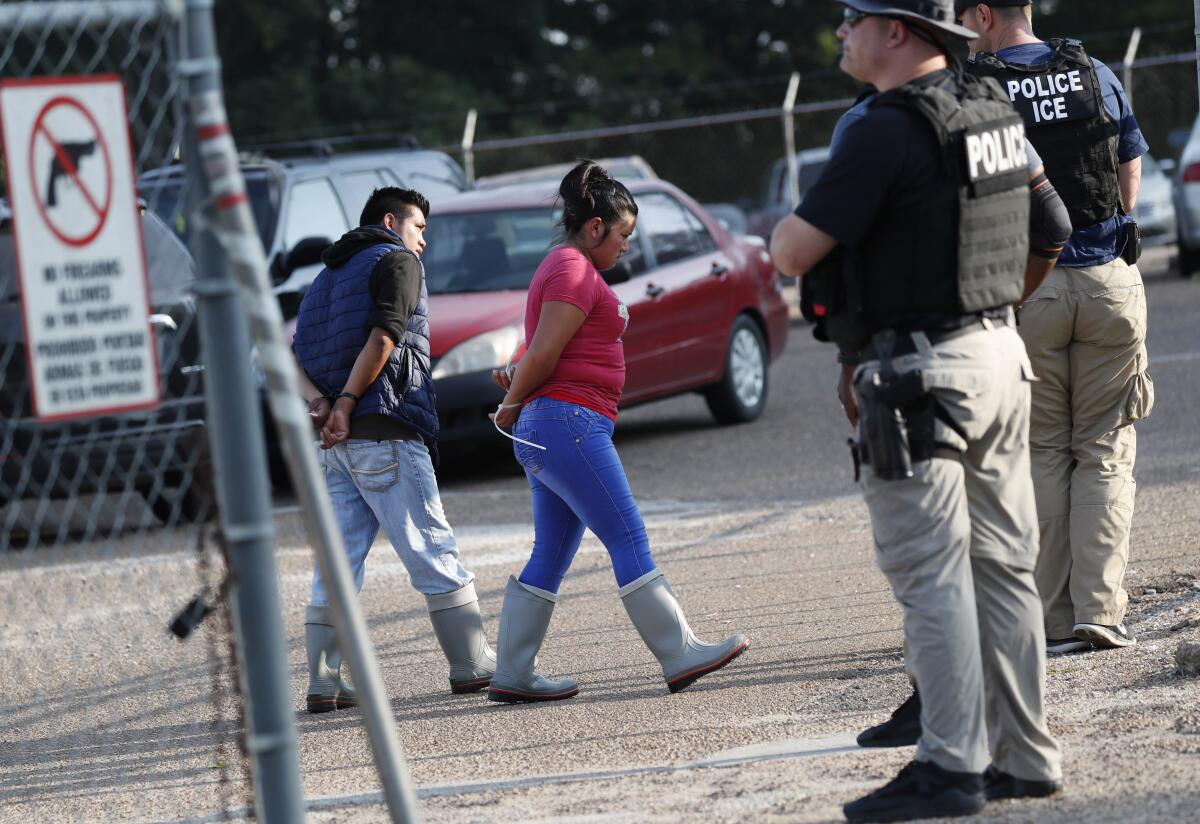Mississippi immigration raids: Residents rally around children who were left alone

- Share via
JACKSON, Miss. — Mississippi residents rallied around terrified children left with no parents and migrants locked themselves in their homes for fear of being arrested Thursday, a day after the United States’ largest immigration raid in a decade.
A total of 680 people were arrested in Wednesday’s raids, but more than 300 had been released by Thursday morning, U.S. Immigration and Customs Enforcement spokesman Bryan Cox said in an email.
Cox said 30 of those who had been released were let go at the plants, while about 270 were released after being taken to a military hangar after the raids. He did not give a reason except to say that those released at the plants were let go because of “humanitarian factors.”
“They were placed into proceedings before the federal immigration courts and will have their day in court at a later date,” he said.
A small group seeking information about immigrants caught up in the raids gathered Thursday morning outside one of the targeted companies: the Koch Foods Inc. plant in Morton, a town of about 3,000 people about 40 miles east of the capital of Jackson.
“The children are scared,” said Ronaldo Tomas, who identified himself as a worker at another Koch Foods plant in town that wasn’t raided. Tomas, speaking in Spanish, said he has a cousin with two children who was detained in one of the raids.
Gabriela Rosales, a six-year resident of Morton who knows some of those detained, said she understands that “there’s a process and a law” for those living in the country illegally. “But the thing that they did is devastating,” she said. “It was very devastating to see all those kids crying, having seen their parents for the last time.”
On Wednesday, about 600 Immigration and Customs Enforcement agents fanned out across plants operated by five companies, surrounding the perimeters to prevent workers from fleeing. Those arrested were taken to the military hangar to be processed for immigration violations.
Before the raid, ICE officials indicated many people would be released with a notice to appear in court because they had never before been through deportation proceedings. Those people were not jailed, but probably won’t be able to resume their old jobs because the federal government alleges they are here illegally.
ICE officials said others would be released if they were pregnant, had small children at home, or had serious health problems.
Koch Foods, one of the country’s largest poultry producers based in the Chicago suburb of Park Ridge, said in a statement Thursday that it follows strict procedures to make sure full-time employees are eligible to work in the country. The company said it vets the employees through the federal government database E-Verify. The company also relies on temporary workers that come through a third-party service tasked with checking employee eligibility, said company spokesman Jim Gilliland.
In Morton, workers were loaded into multiple buses on Wednesday — some for men and some for women — at the Koch Foods plant. At one point, about 70 family, friends and residents waved goodbye and shouted, “Let them go! Let them go!”
The Rev. Mike O’Brien, pastor of Sacred Heart of Jesus Catholic Church in Canton, Miss., said he waited outside the Peco Foods plant in the city until 4 a.m. Thursday for workers returning by bus. O’Brien said he visited a number of parishioners whose relatives had been arrested. He said he also drove home a person who had hidden from authorities inside the plant.
“The people are all afraid,” he said. “Their doors are locked, and they won’t answer their doors.”
Children whose parents were detained were being cared for by other family members and friends, O’Brien said.
“They’re circling the wagons that way and taking care of each other,” he said.
The Mississippi Department of Child Protection Services is investigating whether any immigrant children are in need of foster care while their parents are in detention, spokeswoman Lea Ann Brandon said.
Martha Rogers, chairman and chief executive of the Bank of Morton, said businesses across town would be affected. Rogers said many Spanish-speaking residents had become customers.
“We’ve all been greatly upset,” Rogers said. “We know these people.”
More to Read
Sign up for Essential California
The most important California stories and recommendations in your inbox every morning.
You may occasionally receive promotional content from the Los Angeles Times.









